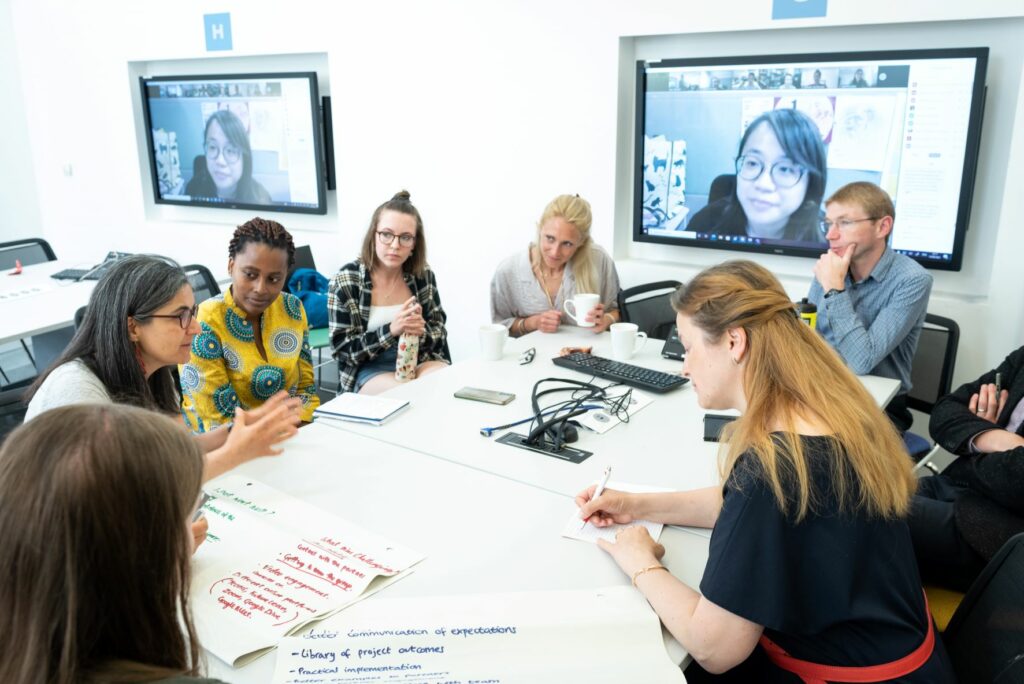CUHK
News Centre
CUHK joins Future17 to cultivate talents for sustainable development and make a world of difference
The Chinese University of Hong Kong (CUHK) has joined Future17, a new multi-institutional, multi-disciplinary programme initiated by the University of Exeter (Exeter) and Quacquarelli Symonds Limited (QS) to give students from CUHK and across the world the opportunity to work together towards the implementation of the 17 United Nations Sustainable Development Goals (SDGs), and develop solutions for tackling some of the grand challenges confronting societies globally.
CUHK works towards sustainability as a Future17 partner
The initiative was started by a consortium of universities from four continents: CUHK in Hong Kong, Exeter in the UK, Stellenbosch University in South Africa and the University of São Paulo in Brazil. The pilot programme was launched in the second term of 2021-22, with 120 students from the four universities. At CUHK, 25 students and 10 academic mentors took part in the programme.
The programme begins with an online induction course introducing students to the SDGs and the design thinking needed to tackle sustainability challenges. In consultation with academics from these universities and SDG Challenge Partner mentors, students were assigned to different international teams collaborating on 11 projects touching a range of grand challenges, and were tasked with designing innovative ways of solving sustainability problems. After completing the programme, the teams will showcase their sustainability projects online. It can also be taken by CUHK students as part of University General Education requirements.
Contributing to a better future
Through this programme, CUHK is fulfilling its commitment to addressing grand challenges and contributing to the well-being of the global community through teaching, research and global engagement.
CUHK Provost Professor Alan Chan said, “Higher education in the 21st century must address the grand challenges that confront humanity. The programme presents an excellent opportunity for students to work with an international team and organisations to solve real-life problems. We hope they will not only gain valuable experience and acquire new skills, but also become future champions of sustainable development. CUHK is pleased to be a founding partner of this global initiative, which aligns with the goals of CUHK 2025, the University’s new strategic plan.”
“Each project team was highly interdisciplinary, composed of students from different fields and backgrounds. Through the programme the students have learned the complex nature of real-world sustainability issues, and realised the necessity to join forces in order to find practical solutions,” said Professor Amos Tai, Associate Director of CUHK’s Office of University General Education. “Everybody can play a role, not only through their own career but also by adjusting their lifestyle, in creating an economically vibrant, socially equitable and environmentally sustainable world.”
A rewarding experience
CUHK students who participated in the projects benefited greatly from the knowledge and experience they acquired. In addition, the solutions developed in the projects generate value for the SDG Challenge Partners, participating universities, businesses and non-governmental organisations.
One example is Enzo Li, a year-two student in Public Health who has participated in the project Educational Toolkit for SDG 13 on climate action. He said, “During the programme, I did a lot of research related to public health and found that some environmental changes, such as sea-level rises and droughts, can affect people’s health. We helped design frameworks and toolkits that will enable academics and other members of the community to educate others on the importance of SDG 13 and how it influences all the other SDGs. It was an excellent opportunity to integrate academic learning with life experiences and community engagement.”
Another year-three student, Osbert Leung, whose major is Urban Studies, also gained valuable insights from his participation in the project Transitioning to a Circular Value Chain for Timber in the Construction Industry in Europe. He said, “Our project aimed to discover how timber as a construction material can be used in a more sustainable and circular way in the European context. Being involved in this project gave me a broader view of the construction industry and the challenges of making a transition to a circular economy. I hope to make a contribution to the goal or other SDGs in the future, and promote the importance of sustainable development in Hong Kong.”
For more details about Future17, please refer to the programme website.




